The rise and fall of the Orekhovskaya organized crime group
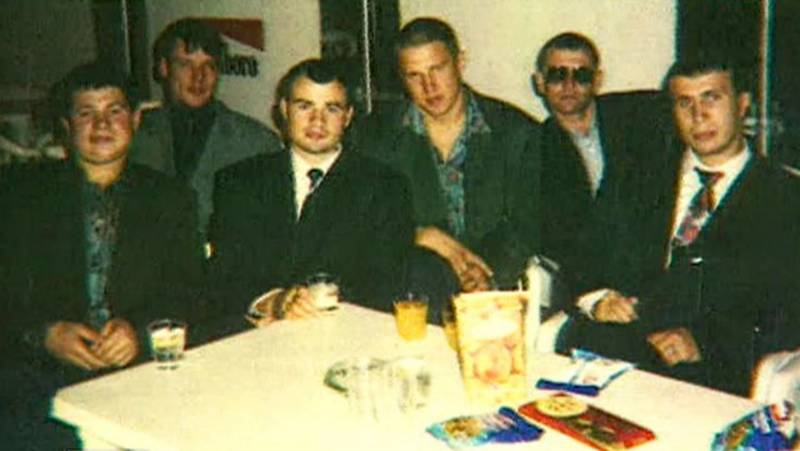
History organized crime groups of the 1990s is a theme widely used by filmmakers, but, alas, not by historians. With such an abundance of films and the big role of bandits in the history of the post-Soviet countries, very few serious scientific and even popular science works are devoted to them. Therefore, even in our time, much remains unexplored. Meanwhile, the study of this topic will allow a broader view of both the history of the 1990s and the state of affairs in modern Russia.
Today we will talk about one of the most famous organized crime groups of those times - Orekhovskaya. It is believed that it was she who served as the prototype for the popular series "Brigade". However, in the Brigade, the organized crime group was largely romanticized and embellished. In the real Orekhovskaya organized criminal group, there was nothing romantic, and even strong male friendship was not discussed.
Sylvester and Orekhovsky
In the mid-1970s, Sergey Timofeev, a resident of the Novgorod village of Klin, moved to Moscow, where he settled in the Orekhovo-Borisovo region, after serving his military service. In his native village, a young guy worked as an ordinary tractor driver, but he was fond of sports and dreamed of becoming a famous athlete. In Moscow, he began working as a karate instructor. Contrary to expectations, Timofeev could not make a big career in sports, his salary was low, and in addition to this, in 1981 the authorities officially banned karate. Now all his training was illegal.
After the marriage and the birth of a child, Timofeev's financial problems became even more acute. In his spare time, he worked as a taxi driver, but this was of little use.
In the mid-1980s, Timofeev got in touch with the Orekhovskaya punks - young guys 18-25 years old, many of whom he coached. Thanks to them, Timofeev got a new and more profitable occupation - thimble-making. Outwardly absolutely innocent, nevertheless it brought serious profit. Timofeev later recalled:
So his financial problems were solved. Timofeev quickly became the leader of the group, soon all Orekhovo-Borisov's thimbles were under his control, then taxi drivers and car thieves. In three years, Timofeev brought virtually the entire region under his control, and his group became widely known in the capital.
At first, his subordinates called Timofeev respectfully "Ivanych", but soon, due to his impressive muscles, he was firmly entrenched in the nickname "Sylvester" (in honor of Sylvester Stallone), under which he entered the history of the criminal world.
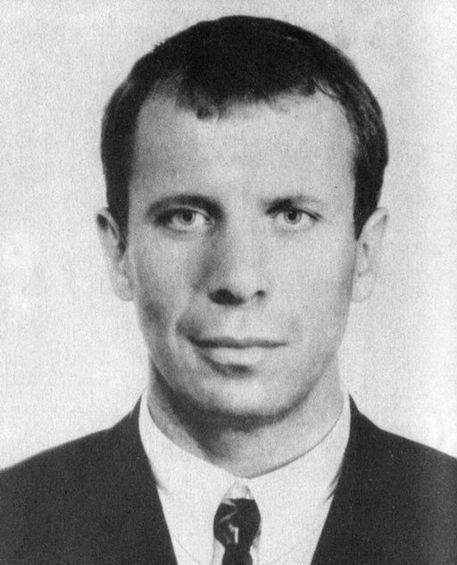
Sergey Timofeev (Sylvester)
The establishment of a new government in Orekhovo-Borisov was not without major conflicts with those who claimed the same role. The main competitors of the Orekhovskaya group, which consisted only of Slavs, were the Caucasian organized crime groups. The first serious encounter with them occurred in July 1988.
The conflict began due to the fact that the Azerbaijanis, realizing that they were deceived into thimbles, refused to pay the lost money. A mass brawl ensued, in which one Caucasian's skull was broken. Initially, they retreated, but already in the evening of the same day, having gathered more than 100 people, they set off to look for Timofeev. He barely escaped in the yard of the local police station. Having failed to find Timofeev, the Azerbaijanis limited themselves to completely destroying his car.
Thus began a long-term confrontation between the Orekhovskaya organized criminal group and the Caucasians, in which more than one hundred people will die in subsequent years.
In the same 1988, the recently emerged Solntsevo OPG joined the Orekhovites. This union ended up being short-lived, but significantly expanded Sylvester's spheres of influence. Now he and his gang controlled and took tribute from gas stations, retail outlets and numerous private entrepreneurs. During a conflict with one of them, Vadim Rosenbaum, Timofeev and the Solntsevo leaders were arrested in late 1989 and charged with extortion. The Solntsevskys were soon released, but Sylvester, taking all the blame on himself, was sentenced to three years in prison.
In prison, he was visited by journalist Larisa Kislinskaya, whom the leader of the Orekhovites gave an interview to. When asked about the reasons for the conflict with the Caucasian organized crime groups, he replied:

Orekhov authorities. Sylvester - far right
At the peak of success
Sylvester was released from prison on parole in 1991. During his absence, the Orekhovskaya organized crime group continued to gain influence and expand the scope of its activities. Thimble-gathering is a thing of the past, now the Orekhovskys were mainly engaged in robbing truckers and selling their goods and trucks.
After leaving prison, Sylvester began to actively engage in legal business. Banks, restaurants, shops and commercial firms appeared at his disposal. He refused to become a "thief in law" and completely denied thieves' concepts. All his behavior indicated that he wanted to create an image of an "honest businessman" for himself.
Of course, bloody showdowns with competitors have not gone away. On the contrary, now they have become more frequent and more bloody than before. However, in most cases, Sylvester instructed his allies to kill opponents, for example, killers from the Kurgan or Medvedkovskaya organized crime groups.
Competitors have not been idle either. The writer-criminologist Nikolai Modestov in his book “Gangster Moscow” described the murder of Alexander Bezzubkin, Sylvester’s deputy, as follows:
In 1993, Sylvester had a conflict with the Bauman organized criminal group. The formal reason for the confrontation is considered to be control over the Arlekino nightclub, but it is likely that the real reason was the alliance of the Bauman gangs with the Caucasian gangs - the worst enemies of the Orekhovskaya organized criminal group.
In this gangster war, allies again come to the aid of Sylvester. So, on April 10, 1993, the killer of the Kurgan organized crime group Alexander Solonik (Sasha Makedonsky) shot Valery Dlugach, the leader of the Bauman organized crime group, nicknamed "Globus", from a carbine. However, the conflict did not end there, in January 1994, Globus' deputy Vladislav Vanner (Bobon) became Solonik's new victim.
In the spring of the same 1994, Sylvester had a conflict over the Tuapse oil refinery with the Georgian crime boss Otari Kvantrishvili. Kvantrishvili was not only a criminal leader, but also a well-known politician, businessman and founder of the Athletes of Russia party at that time.
The outcome of this conflict was similar to the previous ones. April 5, 1994 Kvantrishvili was shot dead, the killer escaped safely. This high-profile murder will be solved only in 2006. It was then that the investigation found out that Sylvester ordered Kvantrishvili to the leader of the Medvedkovskaya organized criminal group Grigory Gusyatinsky, and he instructed his killer Alexei Sherstobitov (Lesha Soldat) to fulfill the order.
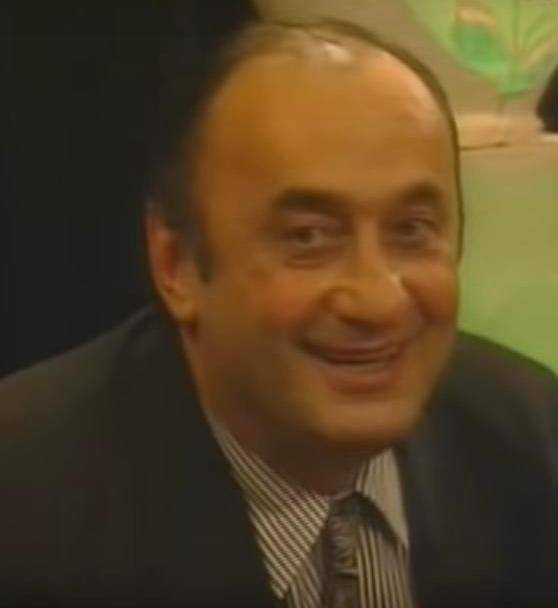
Otari Kvantrishvili
During 1993-1994, the level of influence of Sylvester and the Orekhovskaya group led by him increased many times over. Now the leader of the organized crime group owned not only firms, restaurants and banks, but also actively engaged in real estate, oil business, gold and diamond trading. He also took an active part in the privatization of the Ural metallurgical plants.
All this made Sylvester a dollar billionaire and one of the most influential people in the country. His competitors were now big oligarchs like Boris Berezovsky. In June 1994, an assassination attempt was made on Berezovsky: a parked car exploded at the moment when the oligarch's Mercedes-600 was passing by. As a result, Berezovsky's driver died, and he himself received severe burns.
This high-profile attempt turned out to be the last in which Sylvester was suspected. On September 13 of the same year, a Mercedes-600, already the leader of the Orekhovskaya organized criminal group, was blown up. Here is how the crime boss and colleague of Sylvester Sergey Butorin (Osya) later described this moment:
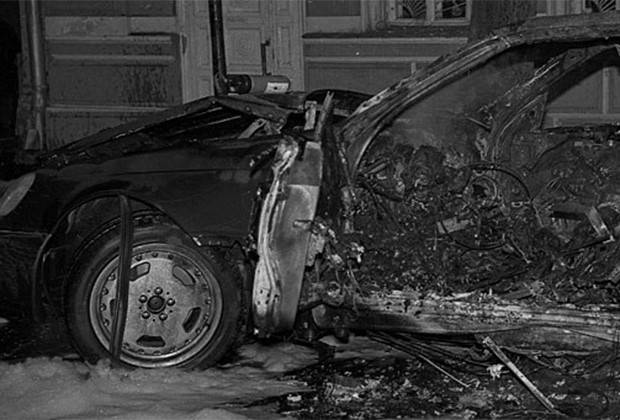
Blown up Mercedes of Sergey Timofeev
This murder has not been solved so far, and there are many versions of who could be behind it. Boris Berezovsky, the leaders of the Caucasian organized crime groups, and friends of the authorities he killed, like Kvantrishvili or Globus, were named as customers of the murder of Sylvester. One of the versions even says that the assassination was arranged by Sergei Butorin himself, who had long claimed the place of Sylvester.
Internecine wars and lawsuits
After the death of Sylvester, the Orekhovskaya organized crime group headed by him broke up into about ten independent gangs. One of them, the most influential, was headed by Sergei Butorin, others were led by such criminal authorities as Igor Chernakov (Dvoechnik), his right hand Alexander Kleschenko (Uzbek Jr.), Sergei Ananievsky (Kultik), Nikolai Vetoshkin (Vitokha), Sergei Volodin (Dragon), Dmitry Belkin (Squirrel) and others.
Soon after the death of Sylvester, long internecine wars began among his recent associates for the remaining multimillion-dollar legacy of the deceased leader. In parallel with these civil strife, there was also a confrontation with the Kurgan, Tambov and numerous Caucasian organized crime groups.
In June 1995, 19-year-old Alexander Kleshchenko (Uzbek Jr.) was shot dead by an unknown person. In March 1996, again, an unknown killer shot Sergei Ananievsky (Kultik), in whose body 20 bullet wounds were found. In the same month, Sergei Volodin (Dragon) was killed in one of the skirmishes.
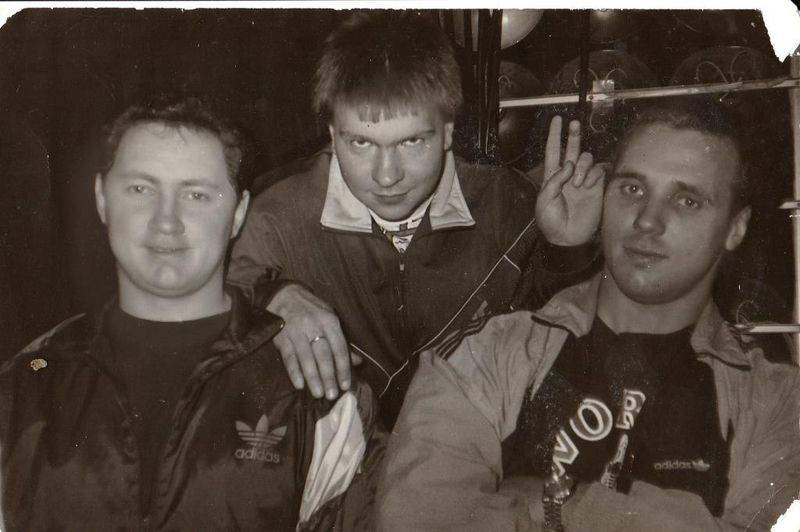
Sergei Ananievsky (Kultik) - on the right. On the left is the leader of the Medvedkovskaya organized crime group Grigory Gusyatinsky
At the end of April 1996, the car of Dvoechnik was ambushed and shot from machine guns, he himself was injured and died a few days later in the hospital. The 26-year-old Dvoechnik was known as one of Sylvester's close associates, to whom he entrusted many important matters. The first attempt on his life took place back in 1994, shortly after the death of Sylvester. A bomb was then planted under his car, but it was prematurely discovered and the attempt failed. Only the third time the attempt to kill Orekhov's authority was crowned with success.
Much later than the others, in November 1998, Nikolai Vetoshkin (Vitokha) was killed.
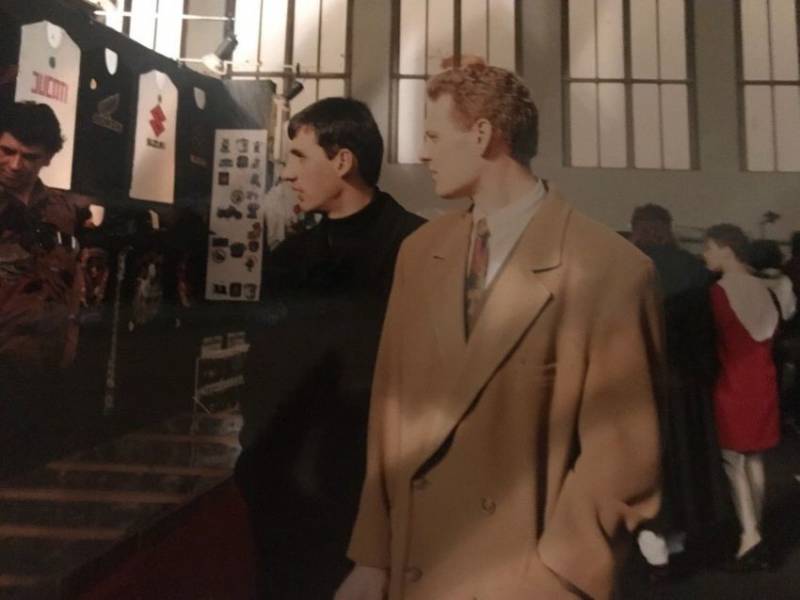
Orekhov authorities Uzbek Sr. and Dvoechnik (on the right)
All this is just a list of high-profile assassinations of leaders. As for ordinary participants in the Orekhovskaya, at least 1995 people died in 1998-150. Most of them are young guys who were not even 30 years old, but who chose their own destiny.
Butorin, who was involved in many high-profile murders during the life of Sylvester, understood that sooner or later his turn would come to him. Therefore, in 1996, he staged his own death, followed by a magnificent funeral, and in the meantime he fled to Spain. Later, he explained his imaginary "death" as follows:
In Spain, Butorin lived a rich and carefree life until 2001. As he himself said, he bought luxury real estate and six expensive cars. All this time, he continued to manage his gang in Russia. It consisted of former military men, employees of the GRU and the FSB. Butorin also had at his disposal the best killers of the era - the already mentioned Solonik and Sherstobitov, as well as Alexander Pustovalov (Sasha Soldat).
Only in 2001, the Spanish police arrested Butorin, along with his bodyguard and part-time killer Marat Polyansky, in a suburb of Barcelona. Since they did not commit any murders in Spain, they were sentenced to 8,5 years in prison only for possession weapons.
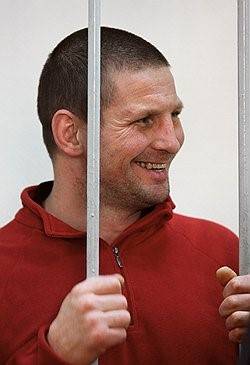
Sergey Butorin
However, in 2010, when this period expired, they were transferred to Russian justice. The Russian court proved that Butorin was involved in at least 38 murders, and these are only proven episodes. The new sentence was quite expected: life imprisonment.
But Dmitry Belkin walked free much longer. For 16 years he lived quietly in Europe, until in 2011 he was arrested by the same Spaniards. He was also transferred to Russia, where he received a life sentence for 22 proven murders.
Currently, about 50 ordinary members and authorities of the Orekhovskaya organized crime group have also survived. They were sentenced to various terms of imprisonment, with the latest sentence being announced as recently as 2020.
In all this history, only the fate of Sylvester's multimillion-dollar inheritance, for the sake of which this bloody war was waged, remains unknown.
Information